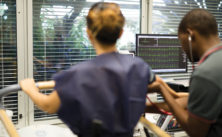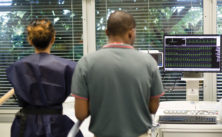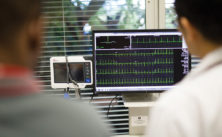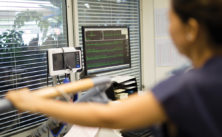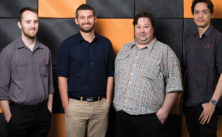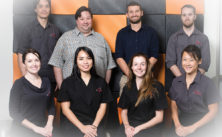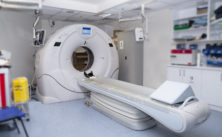Diagnostics
Diagnostics
Cardiac diagnostics refers to tests and procedures that are used to help diagnose heart and blood vessel problems. These tests are provided for both inpatients and outpatients. Your doctor is able to refer you for cardiac monitoring to NT Cardiac and we will send your test results in a timely manner.
The following tests and procedures are provided at NT Cardiac:
24 Hour Ambulatory Blood Pressure Monitor
Blood pressure is recorded for 24 hours with a digital monitor and arm cuff. The monitor is worn on a belt around your waist and there will be a tube connecting the box to a cuff which is worn on your least dominant arm. These must be worn for the entire monitoring period. The monitor is worn on a belt allowing you to carry on with most normal daily activities.
The ambulatory blood pressure monitor should be placed in a small clear bag and returned between 8am and 9am the following day.
Preparation:
Shower before the test. You will not be able to shower or bathe with the monitor on. If you are a male patient you can come prepared by shaving your chest area. If you are unable to, the technician will shave your chest for you.
Duration of Test:
Approximately 15 minutes to apply.
24 Holter Monitor
The heart rhythm is recorded for 24 hours by placing seven electrodes (stickers) on the chest. The skin is prepared with slight rubbing. A digital recorder is used to record your heart rhythm and this is worn on a belt or shoulder strap allowing you to carry on with most normal activities.
The Holter monitor should be placed in a small clear bag and returned between 8am and 9am the following day.
Preparation:
You will not be able to shower or bathe with the monitor on. If you are a male patient you can come prepared by shaving your chest area. If you are unable to, the technician will shave your chest for you. The Holter monitor should be returned the next day.
Duration of test:
Approximately 15 min to apply
Exercise Stress Test
An exercise stress test is used to measure the effect of exercise on your heart. Electrodes (stickers) will be placed on your chest to monitor your heart rhythm or electrical activity during exercise.
Preparation:
Come in comfortable clothing and exercise foot ware. Bring water and a towel. If you are on Ventolin and GTN bring it along with you.
Duration of test:
30 to 60 minutes
Electrocardiogram (ECG)
An electrocardiogram is a simple test that records the electrical activity of the heart. It is performed by placing electrodes (stickers) on the chest, arms, and legs and usually takes only a few minutes. The ECG captures your heart rhythm and can be used as an indicator for coronary disease and arrhythmia.
Preparation:
No preparation required.
Duration of test:
Approximately 5-10 minutes
Echocardiogram
An ultrasound scan of the heart obtained with a probe on the chest wall with ultrasound jelly to help get the images.
Preparation:
Come in comfortable two piece clothing. Refrain from smoking at least 1 hour before the test.
Duration of test:
15-45 minutes.
Transesophageal Echo (TOE)
What is a Transesophageal Echocardiogram?
Transesophageal Echocardiography is a test that helps show the size and shape of the heart, heart chambers and the heart valves. It is a test used to detect blood clots inside the heart, check the aorta (main artery carrying oxygen from the heart), fluid buildup in the pericardium (heart sac) and any other complications of the heart. TOE helps diagnose heart and blood vessel disease, guide cardiac catheterization, access patients after surgery or help prepare for surgery.
It is different to a normal echocardiogram because the probe is placed closer to the heart giving higher quality images.
Preparation:
The patient must fast for six hours prior to test & present as a surgical inpatient to the hospital.
Procedure:
The process is carried out by the use of sound waves to create high-quality images taken from the esophagus (down the throat).
How long does the test take?
Approximately 40 minutes
Results:
–
What are the risks?
–
What to bring on the day:
A current referral from your GP or specialist
Medicare card
Any concession or health insurance cards
Exercise Stress Echocardiogram
Exercise Stress Echocardiogram
Ultrasound images are taken before and after exercise. The images are compared and accessed by the doctor. During the procedure, you will first lay down for the initial ultrasound images and then asked to exercise to 80% of your maximum heart rate. Finally, you will lay down on your back again for the ‘after’ ultrasound images.
Preparation:
Avoid heavy meals prior to the test. Wear comfortable two-piece clothing and walking shoes. Bring water and a towel.
Duration of test:
20 – 40 minutes
Implanted Loop Recorder Check
What is an Implanted Loop Recorder Check?
An implantable loop recorder (ILR) is a small device that is implanted just under the skin to monitor and record the heart’s electrical activity. Symptoms of recurrent loss of consciousness, dizziness or palpitation may indicate you are suffering from an irregular heart rhythm.
Preparation:
Wear comfortable clothing
Procedure:
The Implantable Loop Recorder Check is inserted under the skin and left for a long period of time to identify your symptoms with heart rhythm problem.
How long does the test take?
Approximately 30 minutes
Results:
–
What are the risks?
–
What to bring on the day:
A current referral from your GP or specialist
Medicare card
Any concession or health insurance cards
CT Coronary Angiogram
What is a CT Coronary Angiogram?
Computed Tomography (CT) Coronary Angiography is a non-invasive scan of the coronary arteries which supply blood to the heart, through the injections of an iodine contrast via IV cannula and also GTN spray under the tongue.
Preparation:
Preparation for the test is longer than the duration of this test. The patient will be asked to fill out the questionnaire and an ECG will also be taken prior to the test. An 18G IV cannula insertion will also take place mainly on right cubital fossae (on your arm) to prepare for the test.
Procedure:
The patient will be injected an iodine contrast via an 18G IV cannula and a GTN spray under the tongue and then scanned. The contrast medium enables the coronary arteries and heart chambers to be visualised. The patient may be given a beta blocker medication to assist in slowing the heart rate down to 50-60bpm for optimum results.
How long does the test take?
Approximately 10 minutes
Results:
–
What are the risks?
–
What to bring on the day
A current referral from your GP or specialist
Medicare card
Any concession or health insurance cards
Six Minute Walk Test
What is a Six Minute Walk Test?
A six-minute walk test is a simple observation of heart rate, oxygen saturations, blood pressure and respirations.
Preparation:
Wear comfortable clothing.
Procedure:
A patient’s heart Rate, oxygen saturations, blood pressure and respiration will be recorded. The patient is then asked to walk for 6 minutes. The distance is measured and then the observations are repeated.
How long does the test take?
Approximately 6 minutes
Results
–
What are the risks?
–
What to bring on the day:
A current referral from your GP or specialist
Medicare card
Any concession or health insurance cards
Dobutamine Exercise Test
What is a Dobutamine Exercise Test?
This test uses a drug called Dobutamine to increase the heart rate. It is similar to a stress echocardiogram, however, the patient remains on the bed for the duration of the test.
Preparation:
The patient must fast for 4 hours prior to the test
Procedure:
Once the patient has been given the Dobutamine the patient will remain on the bed for about 45-60 minutes which is the duration of the entire procedure.
How long does the test take?
45-60 minutes
Results:
–
What are the risks?
–
What to bring on the day:
A current referral from your GP or specialist
Medicare card
Any concession or health insurance cards
Pacemaker Check
What is a Pacemaker Check?
A Pacemaker is a device placed under the skin which is used to stimulate the heart muscle and regulate its contractions.
Preparation:
Wear comfortable clothing
Procedure:
A pacemaker check is carried out by placing an interrogator externally over the pacemaker for readings.
How long does the test take?
Approximately 30 minutes
Results:
A report with the finding will be provided to the doctor.
What are the risks?
–
What to bring on the day:
A current referral from your GP or specialist
Patient must bring his or her pacemaker ID card
Medicare card
Any concession or health insurance cards
Implant Defibrillator Check
What is the Implanted Defibrillator Check?
An implanted defibrillator is a device placed under the skin used to reset dangerous electrical activity of the heart
Preparation:
Wear comfortable loose clothing
Procedure:
Regular interrogation of the device is required to ensure its continued correct function and to estimate remaining battery life. This is achieved by placing a wand over the device. There is no invasive component to this test.
How long does the test take?
Approximately 30 minutes
Results:
–
What are the risks?
–
What to bring on the day
A current referral from your GP or specialist
Patient must bring his or her Implant Defibrillator ID card
Medicare card
Any concession or health insurance cards
Tilt Table Test
What is a Tilt Table Test?
A tilt table test is a medical procedure designed to identify common conditions that cause syncopal episodes commonly known as blackouts
Preparation:
Wear comfortable two-piece clothing.
Procedure:
You will be instructed to lay flat on a table while connected to a heart and blood pressure monitor. The table is then tilted to a 70-degree angle and your blood pressure, pulse, and electrocardiograph are monitored for change
How long does the test take?
60 – 90 minutes
Results:
–
What are the risks?
–
What to bring on the day:
A current referral from your GP or specialist
Medicare card
Any concession or health insurance cards

